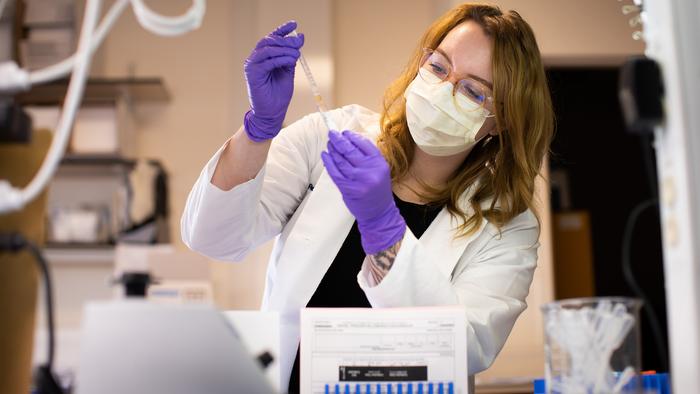May 28, 2024

Credit: University of Michigan Rogel Cancer Center
May 28, 2024
For more information, contact:
Nicole Fawcett, nfawcett@umich.edu
EMBARGOED for release at 6:30 p.m. ET May 28, 2024
Altering cancer treatment dosing could reduce climate impact, study finds
Model estimates potential to reduce greenhouse gas emissions by delivering treatment every 6 weeks
ANN ARBOR, Michigan — Changing how often a popular cancer therapy is delivered would reduce greenhouse gas emissions and improve environmental impact without decreasing cancer survival, according to a new analysis from researchers at the University of Michigan Health Rogel Cancer Center.
The team looked at 7,813 veterans receiving the immunotherapy treatment pembrolizumab through the Veterans Health Administration. Pembrolizumab is an intravenous treatment that is often given every three weeks at a standard, one-size-fits-all dose of 200 milligrams. Researchers estimated the environmental impact of patients coming in for this care every three weeks: carbon dioxide emissions from patients’ transportation to and from the clinic, manufacturing of the drug, and medical waste like needles, tubing and bags used during the compounding and infusing process.
Then they considered alternative scenarios. What if patients received 400 milligrams of pembrolizumab every six weeks, a dose approved by the U.S. Food and Drug Administration? What if they received a dose proportionate to their weight instead of the standard dose, as pembrolizumab was originally approved by FDA? Data suggests these approaches achieve cancer outcomes equivalent to the standard three-week flat dosing and likely reduce the burdens of cancer treatment that patients face.
They found that for this cohort of patients, extending treatments to every six weeks instead of every three weeks would have required 15,000 fewer infusions. That means 15,000 fewer trips to the clinic and 15,000 fewer incidences of compounding and infusing treatments. In total, this change would reduce greenhouse gas emissions in just the VHA by 200 tons per year. Results are published in The Lancet Oncology.
“As providers, every time we’re with a patient we’re faced with this litany of decisions that both we and the patient have to make. Those decisions – every three week dosing or every six week dosing – seem small but they really add up,” said study author Garth W. Strohbehn, M.D., M.Phil., assistant professor of internal medicine at Michigan Medicine.
Next, researchers looked at the impact that the reduced carbon emissions could have on climate change and human health – not just for the person with cancer, but for all of us, due to rising global temperatures. The model indicates that by continuing the current trends in pembrolizumab dosing instead of changing to less-frequent dosing, about three more people will die per year between now and 2100 because of the extra greenhouse gas emissions.
“There will more than likely be folks completely uninvolved in cancer care who are harmed by choosing to dose this medicine the way that we do. It doesn’t need to happen,” said Strohbehn, who is also a member of the U-M Institute for Healthcare Policy and Innovation and early career research scientist at the VA Ann Arbor Center for Clinical Management Research.
“That’s the point we’re trying to make here: There are likely to be health costs that non-patients in a society can expect to bear when we choose to practice cancer care the way we do. Do we have a moral obligation to change the way we’re doing things if the patient in front of us is not harmed by it?”
Patient transportation to and from appointments was the biggest driver of carbon emissions, researchers found, which suggests that less-frequent infusion treatments would not only help the environment but also potentially improve patient quality of life due to fewer trips to the hospital. Researchers also estimated significant cost savings for VHA from the alternative dosing regimens since the total amount of drug used with the weight-based doses is lower than the one-size-fits-all approach, echoing earlier findings from Strohbehn’s team.
The study authors suggest that multiple policy actions would need to be aligned to facility this change. They suggest payers could develop targeted incentives around environmentally conscious care. Professional societies could alter guidelines with environmental sustainability in mind, where patient outcomes are not expected to be impacted by the adoption of more sustainable care. Requiring environmental report cards for individual drugs at the time of approval could also increase awareness.
“I think there’s value in holding a mirror up to the conventional system and encouraging self-reflection,” Strohbehn said.
Additional authors: Alex K. Bryant, Jacqueline R. Lewy, R. Daniel Bressler, Zoey Chopra, Derek J. Gyori, Brian G. Bazzell, Julie A. Moeller, Sofia I. Jacobson, A. Mark Fendrick, Eve A. Kerr, Nithya Ramnath, Michael D. Green, Timothy P. Hofer, Parth Vaishnav
Bryant, Ramnath, Green, Hofer and Strohbehn are supported by the National Cancer Institute grant P30 CA046592.
Disclosure: None
Paper cited: “Projected environmental and public health benefits of extended-interval dosing: An analysis of pembrolizumab use in a U.S. national health system,” The Lancet Oncology. DOI: 10.1016/S1470-2045(24)00200-6
Resources:
University of Michigan Rogel Cancer Center, www.rogelcancercenter.org
Michigan Medicine Cancer AnswerLine, 800-865-1125
# # #
Journal
The Lancet Oncology
Method of Research
Computational simulation/modeling
Subject of Research
People
Article Title
“Projected environmental and public health benefits of extended-interval dosing: An analysis of pembrolizumab use in a U.S. national health system
Article Publication Date
28-May-2024



